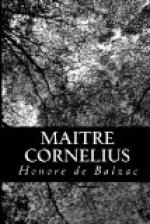CHAPTER II
Thetorconnier
Cornelius Hoogworst, one of the richest merchants in Ghent, having drawn upon himself the enmity of Charles, Duke of Burgundy, found refuge and protection at the court of Louis XI. The king was conscious of the advantages he could gain from a man connected with all the principal commercial houses of Flanders, Venice, and the Levant; he naturalized, ennobled, and flattered Maitre Cornelius; all of which was rarely done by Louis XI. The monarch pleased the Fleming as much as the Fleming pleased the monarch. Wily, distrustful, and miserly; equally politic, equally learned; superior, both of them, to their epoch; understanding each other marvellously; they discarded and resumed with equal facility, the one his conscience, the other his religion; they loved the same Virgin, one by conviction, the other by policy; in short, if we may believe the jealous tales of Olivier de Daim and Tristan, the king went to the house of the Fleming for those diversions with which King Louis XI. diverted himself. History has taken care to transmit to our knowledge the licentious tastes of a monarch who was not averse to debauchery. The old Fleming found, no doubt, both pleasure and profit in lending himself to the capricious pleasures of his royal client.
Cornelius had now lived nine years in the city of Tours. During those years extraordinary events had happened in his house, which had made him the object of general execration. On his first arrival, he had spent considerable sums in order to put the treasures he brought with him in safety. The strange inventions made for him secretly by the locksmiths of the town, the curious precautions taken in bringing those locksmiths to his house in a way to compel their silence, were long the subject of countless tales which enlivened the evening gatherings of the city. These singular artifices on the part of the old man made every one suppose him the possessor of Oriental riches. Consequently the narrators of that region—the home of the tale in France—built rooms full of gold and precious tones in the Fleming’s house, not omitting to attribute all this fabulous wealth to compacts with Magic.
Maitre Cornelius had brought with him from Ghent two Flemish valets, an old woman, and a young apprentice; the latter, a youth with a gentle, pleasing face, served him as secretary, cashier, factotum, and courier. During the first year of his settlement in Tours, a robbery of considerable amount took place in his house, and judicial inquiry showed that the crime must have been committed by one of its inmates. The old miser had his two valets and the secretary put in prison. The young man was feeble and he died under the sufferings of the “question” protesting his innocence. The valets confessed the crime to escape torture; but when the judge required them to say where the stolen property could be found, they kept silence, were again put to the torture, judged, condemned, and hanged. On their way to the scaffold they declared themselves innocent, according to the custom of all persons about to be executed.




